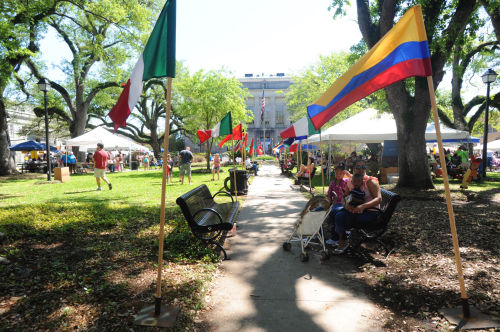The Big Bayou Music Festival Lineup
March 1, 2013
Courts rule in LHSAA’s favor; VCHS ousted from playoffs
March 5, 2013Advocates in downtown Houma rekindle their hub of international flavor, fun and education this month.
CASA of Terrebonne hosts its annual Kid’s Springfest, “A World of Fun” on March 16 in attempt to raise money for the nonprofit, which seeks to recruit and train volunteers to become advocates for children in foster care.
For the eighth consecutive year, the organization turns the downtown courthouse area into a day of fun for children and adults to enjoy. More than 20 booths representing countries like Mexico, Kenya, Egypt and Spain provide games and food dishes for tasting, along with live entertainment and a playhouse raffle.
Last year the event earned CASA of Terrebonne $25,000. It is one of three major fundraisers typically held throughout the year; the other two being a $10,000 raffle and banquet in the fall and a crawfish boil hosted and organized by the owner of Southdown Bar and Grill.
“Typically we have two major events that we host,” says Laci Melancon, executive director of CASA Terrebonne. “We do have a few community members who host events for us like the crawfish boil off by Amos Mosley from Southdown Bar and Grill. He helps coordinate the event and donates all proceeds. Last year he raised $35,000.”
As a nonprofit, the organization seeks any opportunity to raise funds. CASA, which stands for Court Appointed Special Advocates, seeks to help foster children by providing an impartial voice to speak on their behalf, visiting them, filing legal documents and speaking to the judge in court. They deal with children in many situations like neglect, abuse, sexual abuse and drug addiction.
Volunteering takes class time, but the work seems to be worth it to those who stay. In order to become and advocate with CASA, one must be 21 years or older and submit to a background check. Volunteers go through 30 hours of training, in which they learn proper procedures and how to fill out certain documents, along with situations and cases they might find themselves in.
“They learn different material each week, and each lesson is standard through national CASA,” Melancon says. “We take them through the court process and show them what happens when a child comes into foster care. We assist in providing scenarios and different cases and what to expect; some may be sexual abuse, neglect or drug exposed. We aim to educate them on all topics they may inquire along the way.”
Currently CASA of Terrebonne has 43 volunteers serving 76 children. Most of the volunteers are female retirees, though there are younger volunteers as well. Melancon says there is a definite male presence missing in her volunteer staff.
“We definitely need more of a male presence because we do have a lot of male children and sometimes they need that male guidance,” Melancon says. “Right now we have 41 female and 2 male volunteers.”
A missing male presence is a trend that spills over into Lafourche parish.
“We do have a shortage of male volunteers,” says Aimee Lemmon, CASA of Lafourche executive director. There was only one male signed up for the spring training session.
“This summer training we’ll push for males, and we need to find more volunteers in central and south Lafourche,” Lemmon says. “The majority of our children come from central and south Lafourche and we really need volunteers to represent that area we serve.”
During training, volunteers meet two nights a week, which Melancon sees as a deterrent in getting more male volunteers.
“For our summer training we’re looking at launching a flex training, which combines online and face to face,” Melancon says. “I’m hoping to accommodate more people that way, maybe males who work offshore.”
More volunteers mean more children served by the nonprofit, which currently has children on a waiting list. However, more children also means more money. Typically it cost about $1,400 per child per year they are represented. An average case lasts about two years.
“Children with CASA are two times more likely to be adopted and spend less time in foster care,” Melancon says.
In Lafourche, they are able to serve 70 children, though there are 200 foster children in the parish. Not only is there a shortage of volunteers, but also foster parents, causing children to be sent to other parishes.
The volunteers play a crucial role the mission of CASA. Often times the judge relies on them as an impartial voice, providing opinions on the child’s living situations and other aspects.
“The judge can’t be around the kids and see what’s going on, so they need someone with non-biased voice,” Melancon says. “Their goal is to speak on behalf of the child but also in the best interest of that child.”
CASA of Lafourche will host a 5K, “Run for the Child,” on April 27 at Nicholls State University – one of two large annual events. On April 10 they will host “CASA on Canal,” an event held in honor of child abuse prevention month. The event, in front of St. Joseph Cathedral will feature speakers and a choir performance. The organization hopes that members of the community will wear blue to show support.
Ultimately the organizations want what is best for children, whether it is that they are allowed to return home or that they remain in a foster home and are adopted. Whatever the outcome, CASA strives to provide the child with the best representative, that they might have a chance to start anew.
“Our primary goal is to have the child in a safe and permanent home, whether it is to reunite them with their parents or adoption, depending on the case,” Melancon says.
CASA of Terrebonne hosts one of its major fundraisers March 16, ‘A World of Fun.’









